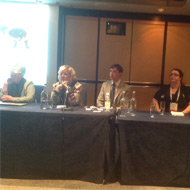Just because we can, does it mean we should?

Each member of the panel was invited to present his or her views on ethical issues facing the veterinary professions.
This was a refreshingly candid BSAVA Congress session in that all the participants were present in a personal capacity and not representing any particular organisation. At the outset, each member of the panel was invited to present his or her views on ethical issues facing the veterinary professions.
Sheila Crispin mentioned that we were in a position in which we could not obtain consent from our patients. Jacqui Molyneux said that maintaining the status of the profession is important. James Yeates picked on two themes: there is a need for generation and implementation of evidence and, although we can be welfare focused, people keeping the animals are not welfare focused.
Sophie Adamantos emphasised the importance of heeding the views of nurses who work most closely with the patients. Louise Dwyer said she had concerns about just how far we should go with the application of novel techniques in referral practice and the administration of novel drugs.
The Interactive nature of this session enabled the audience to register their views. The reaction to the use of blood transfusion was generally positive, but opinions toward kidney transplant were generally negative, and the use of stem cells was halfway down the line. James Yeates pointed out that in each of these examples there was a 'cost benefit' analysis for both the donor and the recipient animals.
Interestingly, there was a majority audience view that blood transfusion was more acceptable in dogs than cats because of the more stressful consequences to donor cats. Are we desensitised to the consequences for the donor? As an analogy, would we be comfortable for our children to become blood donors?
The audience was asked to consider the injection of a cat with a product to reduce its allergenicity for the benefit of the owner. This produced a diversity of opinion.
The next scenario was whether cats with TB should be treated. The main issue is that many of these cats are seriously unwell, the condition is often potentially zoonotic and there was a concern about the use of drugs that are critical in human medicine and have to be given on multiple occasions over an extended period of months.
There may be a need to focus closely on the choice of appropriate clients/cats for treatment. We should not lose sight of the serious zoonotic consequences.
Discussions then moved on to examples of conditions that impinged on the animal's quality of life. How do we assess quality of life? This is difficult because it first involves elimination of other clear constraints before establishing an objective 'prophesy' of likely prognosis.
It is important not to enter the realms of anthropomorphism. As vets we must make our assessment of what is right for the animal. This is the priority, not what is 'right' for the owner. We have to avoid embracing owners' feelings of regret – treating or not treating – which is part of the normal grieving process and would happen anyway.
Although we have to support clients in these circumstances, it should never be to the extent that the animal's welfare is compromised. The role of the veterinary surgeon is to help clients to let their pet go without guilt. There is a tendency, especially with the benefit of hindsight, that the euthanasia decision is left too late.
It was pointed out too that we should not only be aware of the quality of life but also the quality of death. There may be a good case for introducing clients to quality of life assessment protocols that they fill in over a period of time, especially when older animals are involved.
James Yeates summarised the overall view. "Our ultimate responsibility must always be to safeguard the welfare of the animal," he said.



 The Veterinary Medicines Directorate (VMD) is inviting applications from veterinary students to attend a one-week extramural studies (EMS) placement in July 2026.
The Veterinary Medicines Directorate (VMD) is inviting applications from veterinary students to attend a one-week extramural studies (EMS) placement in July 2026.